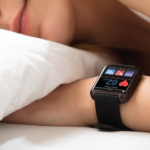As the popularity of smartphone apps and wearable physical activity monitors continues to grow, more clinicians may encounter cases like the one presented above. Clinicians and other healthcare professionals will need to balance the abundancy of these technologies and patients’ beliefs of how effective they will be, with the evidence in the literature of the efficacy of the technology to assist with behavior change, as well as individual patient characteristics that could influence the ability to obtain or use the technology.
What Would You Do?
As the technology continues to rapidly outpace the research, what would you do? Do you encourage your patients to use an intervention that may or may not be beneficial?
Sara M. Rothberger, PhD, is a post-doctoral fellow in the Department of Exercise Science and a member of the Technology Center to Promote Healthy Lifestyles at the University of South Carolina in Columbia.
Linda S. Ehrlich-Jones, RN, PhD, is an assistant director, Center for Rehabilitation Outcomes Research at the Shirley Ryan AbilityLab, Chicago, and research associate professor of physical medicine and rehabilitation in the Feinberg School of Medicine at Northwestern University in Chicago.
Christine A. Pellegrini, PhD, is an assistant professor of exercise science and a member of the Technology Center to Promote Healthy Lifestyles at the University of South Carolina in Columbia. She is a member of the ACR’s Committee on Ethics and Conflict of Interest.
References
- Mobile fact sheet. Pew Research Center Internet and the American Life Project. 2017 Jan 12.
- Tech-styles: Are consumers really interested in wearing tech on their sleeves? The Nielsen Company LLC. 2014 Mar 20.
- Misra S. New report finds more than 165,000 mobile health apps now available, takes close look at characteristics and use. iMedicalApps. 2015 Sep 17.
- Conroy DE, Yang C, Maher JP. Behavior change techniques in top-ranked mobile apps for physical activity. Am J Prev Med. 2014 Jun;46(6):649–652.
- Pagoto S, Schneider K, Jojic M, et al. Evidence-based strategies in weight-loss mobile apps. Am J Prev Med. 2013 Nov;45(5):576–582.
- Jakicic JM, Davis KK, Rogers RJ, et al. Effect of wearable technology combined with a lifestyle intervention on long-term weight loss. JAMA. 2016 Sep 20;316(11):1161–1171.
- Spring B, Pellegrini CA, Pfammatter A, et al. Effects of an abbreviated obesity intervention supported by mobile technology: The ENGAGED randomized clinical trial. Obesity (Silver Spring). 2017 Jul;25(7):1191–1198.
- Burke LE, Conroy MB, Sereika SM et al. The effect of electronic self-monitoring on weight loss and dietary intake: A randomized behavioral weight loss trial. Obesity (Silver Spring). 2011 Feb;19(2):338–344.
- Laing BY, Mangione CM, Tseng C-H, et al. Effectiveness of a smartphone application for weight loss compared with usual care in overweight primary care patients. Ann Intern Med. 2014 Nov 18;161(10 suppl):S5–S12.
- Pellegrini CA, Verba SD, Otto AD, et al. The comparison of a technology-based system and an in-person behavioral weight loss intervention. Obesity (Silver Spring). 2012 Feb;20(2):356–363.
Editor’s note: If you have comments or questions about this case, or if you have a case that you’d like to see in Ethics Forum, email us at [email protected].
